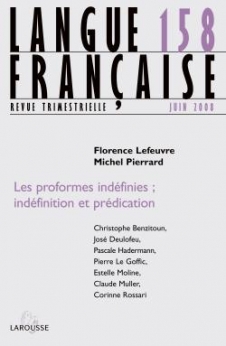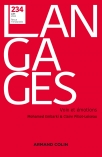
Langue française n° 158 (2/2008)
Pour acheter ce numéro, contactez-nous
Recevez les numéros de l'année en cours et accédez à l'intégralité des articles en ligne.
The authors study the proform quoi when it is anaphoric of a predicative phrase (Il déjeuna. Après quoi il partit). In this structure, this proform loses several properties – what shows a grammaticalisation in progress. The authors make the assumption that quoi functions as a relative pronoun or an indefinite pronoun without value of subordination. Five groups emerge : In the first one, the demonstrative ce is essential as antecedent to the pronoun quoi, with a predicative value (Ce à quoi il parvint). In the second one, ce is optional (Ce en quoi il a raison / Ce à quoi elle répliqua que P); it can have a predicative value with the preposition en but not with the preposition à. In the third and the fourth groups, ce is impossible : in the third group, the group prep. + quoi (à quoi) assumes an argumentative function whereas in the fourth group, the group prep. + quoi (après quoi) is an adverbial phrase. At last, in the fifth group, quoi can be analysed as an indefinite pronoun: the utterances it introduces accept a different modality from the previous sentence, i.e. the interrogative modality.

